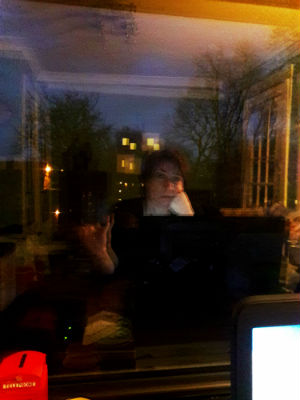Today is International Women’s Day, and in consequence I would like to talk about a particular part of a woman’s body that gets a great deal of attention. No, not that part. Not that one either.
I’m talking about the mouth.
Seems to me that we’re always talking about the mouths of women, and particularly we talk about what’s going into a woman’s mouth, or else what’s coming out. Succinctly, then:
What’s going in.Susan Bordo pointed out some years ago the sedimented notions of gender and eating in visual advertisements. In advertisements for food, she argued (with many examples), men eat and women prepare. Women serve food to their children and their men: they don’t eat it. If they do eat, it is in controlled portions with low calories which they make for themselves at a time when nobody else can see them. A woman is caught in a closet with a pint of low-cal Haagen-Dasz; a man swans off a diving board into a three-scoop bowl of chocolate ice cream with not a calorie counter in sight. Almost twenty years later I pick up a Woman’s Day magazine, and with very few exceptions, the same narratives obtain.
We have not even got as far as the whole fat thing yet, except to talk about calories, and since we’ve now had food scientists assert that it’s indeed the calories that taste good, we don’t even have to go there to talk about those calories. The narrative is: woman putting something in her mouth that gives her pleasure = suspect. If she hasn’t fed the kids first, outright transgressive. I’d love to see a growing preponderance of visual advertisements that depict a woman consuming something with enjoyment that does not suggest guilt (even by mentioning guilt’s absence) or sin or temptation or any other hovering transgressiveness.
What a woman consumes by mouth is naturally a metaphor for other kinds of appetite: hence the deep suspicion of contraception as a means of license for women’s sexual appetites which will be uncontrolled as soon as they are freed from the “consequences” that keep them in check, and a sense that anysatisfaction of that appetite must benefit the race in order to be licit.
Indeed, even women’s intellectual appetites are a transgression, as the whole plot of Gaudy Night draws out: a woman either has bad taste in novels, films, and public discourse, or else she is wasting time that would be better spent doing something useful.
All of this is so ubiquitous that to point it out is either to belabor the obvious or to draw a defensive response from the sex not concerned, and that brings me to the other function of mouths.
What’s coming out. My father’s favorite epithet for me when I was growing up was “sharp-tongued,” and though it was effective in making me feel unlovely and inappropriate by nature, what I often thought most when I heard it was that my tongue clearly wasn’t sharp enough, or it would have cut me an escape hole by now.
What actually happens when I open my mouth as an adult is that people say: “What?” “I’m sorry, speak up, I can’t hear you.” “Say that again?” Never is this more problematic than when I am invited into the pulpit: I have to project far beyond what feels comfortable in order to be sure of being heard, to push the envelope of ineffectual yelling to make sure my words are understood. In fact, just the other day I was in a restaurant with my mother and sister and brother, and the waiter had to ask every single one of us to repeat our order over the background noise. “We’re quiet talkers,” my mother said laughingly. Well…yes. That, I think, is its own comment.
Yet it’s not untrue that I can be sharp-tongued, as any longtime reader of my rants on this blog may be able to attest. But how much is this an indictment of my very being, and how much is the equally-sedimented notion that women’s voices are heard too much, that to be a woman and to call for redress or repentance or recognition is to be a scold and a harpy, to snatch unlawful airwaves and display inherent ignorance, to rebel against the rightful judgment imposed from without? If women are saddled with an anxiety of eating, surely they are equally saddled with an anxiety of speaking.
In this context let me compare two well-known passages from the Middle Ages. First, the Clerk in Chaucer’s Canterbury Tales ends his tale of patient Griselda with an envoie clearly intended as a smack at the Wife of Bath, whose prologue was longer than her tale. He says in part:
O noble wyves, ful of heigh prudence,
Lat noon humylitee your tonge naille,
Ne lat no clerk have cause or diligence
To write of yow a storie of swich mervaille
As of Grisildis pacient and kynde….
Folweth Ekko, that holdeth no silence,
But evere answereth at the countretaille….
Ye archewyves, stondeth at defense,
Syn ye be strong as is a greet camaille;
Ne suffreth nat that men yow doon offense.
And sklendre wyves, fieble as in bataille,
Beth egre as is a tygre yond in Ynde….
Ne dreed hem nat, doth hem no reverence,
For though thyn housbonde armed be in maille,
The arwes of thy crabbed eloquence
Shal perce his brest….
The words of women are clearly seen here as weapons to make men cower, and indeed are the only weapons available to them, since they are physically weaker and at a social disadvantage. “Ne suffreth nat that men yow doon offense” — you can practically hear the sarcasm dripping from the page — “Don’t let men get away with offending you by any means,” as if a woman ever does, amirite? Yet though a woman can beat a man down with words, he may well go down believing he was in the right all along, and aggrieved that he cannot retaliate with physical violence.
Compare the long-awaited appearance of Beatrice at the end of the Purgatorio, where she meets Dante not with gentle words but with a stern scolding:
“With inspirations, prayer-wrung for his sake,
Vainly in dreams and other ways as well
I called him home; so little did he reck.
And in the end, to such a depth he fell
That every means to save his soul came short
Except to let him see the lost in hell.
For this the gateway of the dead I sought,
And weeping, made request of him by whom
He has been raised thus far and hither brought.
It would do violence to God’s high doom
If Lethe could be passed, and ill-doers
To taste this blessed fare could straightway come
Without some forfeit of repentant tears….
O thou, yon side the sacred stream,” said she,
Turning the sharp point of her speech my way —
Though even the edge seemed sharp enough to me —
And thus continuing without delay;
“Say, say if this is true; so grave a charge
Requires thine own confession; therefore say.”
Dante’s response to this is to indeed give up the “forfeit of repentant tears,” to weep and admit his wrong before the whole company of the Earthly Paradise, and in fact to swoon at the overwhelming consciousness of this terrible truth. It is after that that Beatrice leads him up into Paradise, making him more able, the more he comprehends of Heaven, to look upon her beautiful smile.
There are two things to be said about this. One is that however problematic the doctrine of Courtly Love may be in other respects, it at least introduced the concept of a woman as a man’s liege-holder, who by his love for her “bears rule” over him and therefore has the right to so chastise him when he is in the wrong. This is a rule he offers her freely, but it is also a rule that reflects the reality of her dazzling effect on him.
Which leads me to the second thing. The figure of Beatrice is unequivocally put forward as a “God-bearer” to Dante — someone who is the image of God, or an image of God, to him who loves her. The Divine Comedy is the story of a particular man who encounters God in this particular way, but were we each to write our own Divine Comedy we should (if we are lucky) have our own God-bearing person or image to lead us home with such patience no matter how little we reck. The point is that women are, as men are, the image of God. And whether one thinks that God made us in God’s image, or we made God in ours, this truth still holds — that we, humanity, this quintessence of dust, are nevertheless a brightness we can show to one another and to bear rule over one another, and we show our Godlikeness in our gift of language.
We humans have mouths, by which we eat and drink, and from which we speak, and I am taking this time out of my day to say that half of us should bear well in mind that we are fundamentally allowed to eat and drink and speak. We are anxious because the power to eat and drink and speak is presented to us as a power we have no right to. But it’s just not true.
Because women are the image of God.
[Originally published 3/8/2012]




